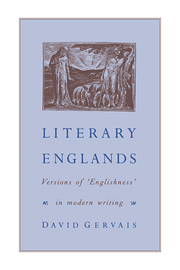Book contents
- Frontmatter
- Contents
- Preface
- Acknowledgements
- Abbreviations
- 1 The nineteenth century: pastoral versions of England
- 2 Edward Thomas: An England of ‘holes and corners’
- 3 Forster and Lawrence: exiles in the homeland
- 4 Late witness: George Sturt and village England
- 5 Contending Englands: F. R. Leavis and T. S. Eliot
- 6 Englands within England: Waugh and Orwell
- 7 Larkin, Betjeman and the aftermath of ‘England’
- 8 Geoffrey Hill and the ‘floating of nostalgia’
- Afterword: A homemade past
- Index
1 - The nineteenth century: pastoral versions of England
Published online by Cambridge University Press: 15 October 2009
- Frontmatter
- Contents
- Preface
- Acknowledgements
- Abbreviations
- 1 The nineteenth century: pastoral versions of England
- 2 Edward Thomas: An England of ‘holes and corners’
- 3 Forster and Lawrence: exiles in the homeland
- 4 Late witness: George Sturt and village England
- 5 Contending Englands: F. R. Leavis and T. S. Eliot
- 6 Englands within England: Waugh and Orwell
- 7 Larkin, Betjeman and the aftermath of ‘England’
- 8 Geoffrey Hill and the ‘floating of nostalgia’
- Afterword: A homemade past
- Index
Summary
To use the word ‘pastoral’ in a modern context is not necessarily to imply all the affectation and evasiveness it carries with it from earlier periods. Dr Johnson considered it the most insipid form of poetry but, conceived as a contrast to the new England of mills and railways, it could be as serious as more hard-bitten kinds of literature. There is nothing sentimental about Blake's ‘rural pen’. In the sense in which it is used in the present chapter, ‘pastoral’ is as likely to be radical in import as conservative. In relation to the ‘real’ England of the time, far from being distanced and poetical, it was often a writer's means of confronting what was most problematic in the present. This does not mean, of course, that the pastoral of the period was free from nostalgia, though the word ‘free’ surely begs the question. For the nostalgia of writers like, say, George Eliot or William Morris, dissimilar as they seem, was itself a way of raising questions.
With an idea as large as ‘England’ there is always some earlier source to go back to: Drayton, Spenser, even Chaucer. Yet continuity cannot be taken for granted. Are Shakespeare's John of Gaunt and Sir Henry Newbolt really speaking about the same thing when they invoke ‘England’? Every idea of England predicates a slightly different England.
- Type
- Chapter
- Information
- Literary EnglandsVersions of 'Englishness' in Modern Writing, pp. 1 - 27Publisher: Cambridge University PressPrint publication year: 1993



